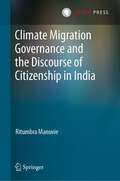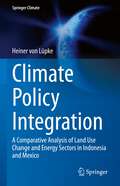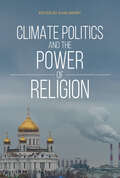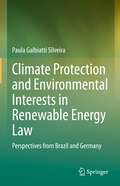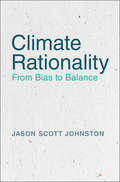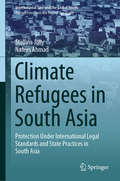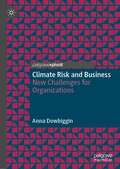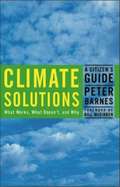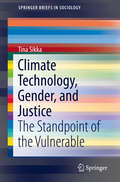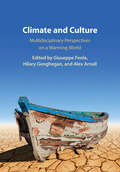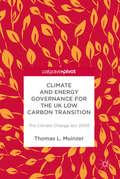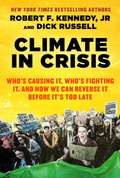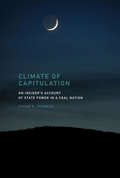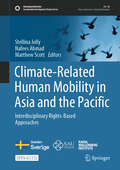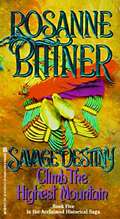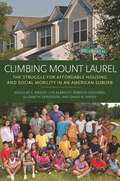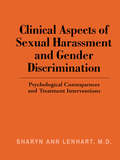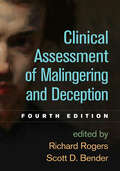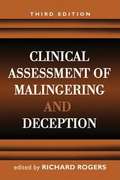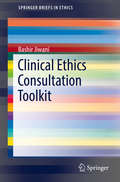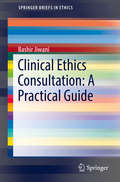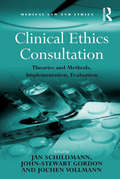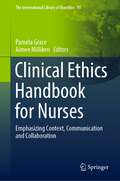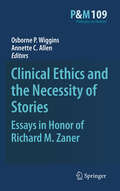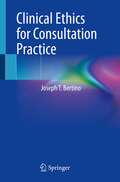- Table View
- List View
Climate Migration Governance and the Discourse of Citizenship in India
by Ritumbra ManuvieThis book offers an in-depth analysis of how governments in vulnerable regions respond to climate migrations. The author argues that, despite the newness of the discipline, responding to hydro-meteorological disasters at the sub-state level is fairly old and institutionalised. Using the example of India, and the State of Assam, the author demonstrates how existing rights-based frameworks are used as norms for governing climate migrations. However, these normative frameworks become futile when the sub-state simultaneously contests the status of climate migrants as legitimate citizens. Instead, the responsibility is replaced with pity-making and the state becomes an empathetic spectator - who understands the misfortune but refuses to be held accountable for either the development or protection of those worst affected by climate change. Those who migrate due to climate change often find themselves stripped of their lands (because of erosion) and their political belonging to the society. The volume will be useful for those studying climate migrations and disaster responses to better understand how communities which are most affected by climatic disasters may not even have a right to have rights against the State they found themselves in. Ritumbra Manuvie is a Senior Researcher and Lecturer of Law at the University of Groningen, The Netherlands. The author studied migration, citizenship, and belonging in Assam during her doctoral work at the University of Edinburgh. She is currently part of the ELSA - North Netherlands lab which aims to study Ethical, Legal, and Socio-political factors that influence the usage of AI in the health sector.
Climate Policy Integration: A Comparative Analysis of Land Use Change and Energy Sectors in Indonesia and Mexico (Springer Climate)
by Heiner von LüpkeThis book analyzes climate policy integration processes by investigating cause-effect relations in cases of integrating climate policy in energy and land-use sectors of Indonesia and Mexico, taking a novel comparative case study approach. The book identifies root causes for integration outside of the public administration, discussing decisive factors in the political economy of the energy and land-use sectors. Showing how policy windows may open for the successful integration of climate policies nevertheless, the book addresses the need to identify and properly use these windows to establish the administrative and institutional arrangements for effective climate policy implementation. This book offers two-fold insights for overcoming the challenges posed by climate policy integration: Firstly, it contributes to theory-building by amending theories of the policy process and by taking a wider perspective on the role of integration in the context of transformational change processes in emerging economies. Secondly, it sets forth a set of research-based practical policy recommendations on how to foster climate policy integration in the political decision-making processes as well as the public administration structures. Therefore, this book will appeal to scholars and researchers of public policy, public administration, political science, and environmental sciences, as well as policy-makers and practitioners interested in a better understanding of climate policy integration in energy and land-use sectors.
Climate Politics and the Power of Religion
by Ken Conca Andrew Thompson Ana Mariella Bacigalupo Kelly D. Alley J. Brent Crosson David T. Buckley Roger-Mark De Souza Neeraj VedwanHow does our faith affect how we think about and respond to climate change?Climate Politics and the Power of Religion is an edited collection that explores the diverse ways that religion shapes climate politics at the local, national, and international levels. Drawing on case studies from across the globe, it stands at the intersection of religious studies, environment policy, and global politics.From small island nations confronting sea-level rise and intensifying tropical storms to high-elevation communities in the Andes and Himalayas wrestling with accelerating glacial melt, there is tremendous variation in the ways that societies draw on religion to understand and contend with climate change. Climate Politics and the Power of Religion offers 10 timely case studies that demonstrate how different communities render climate change within their own moral vocabularies and how such moral claims find purchase in activism and public debates about climate policy. Whether it be Hindutva policymakers in India, curanderos in Peru, or working-class people's concerns about the transgressions of petroleum extraction in Trinidad—religion affects how they all are making sense of and responding to this escalating global catastrophe.
Climate Protection and Environmental Interests in Renewable Energy Law: Perspectives from Brazil and Germany
by Paula Galbiatti SilveiraThis book is about environmental and climate legal protection in the energy transition. The Paris Agreement has a binding commitment of holding the global temperature increase to 2°C while pursuing efforts to limit it to 1.5°C. To cope with the negative effects of climate changes and mitigate greenhouse gas emissions, one of the primary responses has been the deployment of renewable energy sources, transiting from fossil fuels to sustainable electricity production. However, renewable energy sources can also cause significant environmental impacts. Wind energy, for instance, can impact biodiversity, such as birds and bats, killing them when colliding with turbines and affecting their migration and nesting.This results in conflicts in environmental law. This book questions whether, in the energy transition, the generation of electricity from renewable sources to protect the climate is compatible with the protection of the environment, both interests in environmental law.To address this question, this book follows a legal-environmental perspective and assesses the common problem of solving those internal environmental conflicts in Brazilian and German law to understand and compare whether and how both legal systems solve the conflicts by compatibilizing the protection of the climate with other environmental interests. The legal analysis focuses on land-use planning and environmental licensing, assessing similarities and differences, and evaluating the results, identifying what one country can learn from the other.
Climate Rationality: From Bias to Balance
by Jason S. JohnstonMost environmental statutes passed since 1970 have endorsed a pragmatic or 'precautionary' principle under which the existence of a significant risk is enough to trigger regulation. At the same time, targets of such regulation have often argued on grounds of inefficiency that the associated costs outweigh any potential benefits. In this work, Jason Johnston unpacks and critiques the legal, economic, and scientific basis for precautionary climate policies pursued in the United States and in doing so sheds light on why the global warming policy debate has become increasingly bitter and disconnected from both climate science and economics. Johnston analyzes the most influential international climate science assessment organizations, the US electric power industry, and land management and renewable energy policies. Bridging sound economics and climate science, this pathbreaking book shows how the United States can efficiently adapt to a changing climate while radically reducing greenhouse gas emissions.
Climate Refugees in South Asia: Protection Under International Legal Standards and State Practices in South Asia (International Law and the Global South)
by Stellina Jolly Nafees AhmadThis book addresses the forms of legal protection extended to people displaced due to the consequences of climate change, and who have either become refugees by crossing international borders or are climatically displaced persons (CDPs) in their own homelands. It explores the legal response of the South Asian Jurisdictions to these refugee-like situations, and also to what extent these people are protected under current international law. The book critically examines and assesses whether States have obligations to protect people displaced by climate change under international refugee law (IRL) and international climate change law (ICCL). It discusses the issue of climate migration in South Asia, analyzes the legal and judicial response initiated by South Asian nations, and also investigates the role of SAARC in relation to climate change and climate refugees. Drawing on the International Legal Standards and States’ Practices in South Asia regarding climate refugees, the book shows how IRL, ICCL, and IHRL (international human rights law) have been used to address and identify the gaps in the global legal protection framework concerning the contours of the normative debate on climate refugees, climate change displacement, migration, forced migration, susceptibility to climate change, typology of climate change-induced displacement, role of the SAARC and its municipal legal systems, approaches to climate change, human mobility and developing a hybrid regional law, or advocating a legal alternative of equal measure in a region characterized by diversity and multiculturalism. The book offers valuable takeaways for students, researchers, consultants, practitioners and policymakers alike.
Climate Risk and Business: New Challenges for Organizations
by Anna DowbigginAddressing the urgency of radical decarbonization as a mitigative response to climate risk, this book explores how business can respond to the challenges of climate risk, through various transformational processes. Those processes involve cognitive transformations, organizational changes, climate risk integration into risk management practices, shifts in corporate reporting and disclosure as well as futuristic scenario-based planning beyond normal business planning cycles. Though much has already been written on corporate sustainability efforts, there is a greater need now for building mitigative capacity at the firm level, in alignment with shifting policy and regulatory regimes. Theoretical and empirical work on these areas is addressed in the novel thought experiment approach of this book. A research agenda for future work is provided.
Climate Solutions: A Citizen's Guide
by Peter BarnesIn 2006, NASA's top climate scientist warned that we have at most a decade to turn the tide on global warming. After that, James Hansen said, all bets are off. Temperature rises of 3 to 7 degrees Fahrenheit will "produce a different planet." If Hansen is right--and most scientists think he is--then every year lost is a year closer to the precipice. In more positive terms, we have one last chance-but one chance only-to save the planet. This guide is about that last chance. It's a result of hundreds of how-do-we-do-this-right discussions over many years. Author and entrepreneur Peter Barnes want to share what he's learned in these discussions because the climate crisis must be solved now, and popular understanding is a prerequisite to getting a solution that actually solves the problem. As a result of these numerous discussions, Barnes come to appreciate that climate policy isn't as simple as one would want it to be. But it's not rocket science, either. When details get complicated, the key is to remember what we, as a nation and a species, must very quickly do: install a workable and lasting system for limiting our use of the atmosphere.
Climate Technology, Gender, and Justice: The Standpoint Of The Vulnerable (Springerbriefs In Sociology Ser.)
by Tina SikkaThis book is the first to undertake a gendered analysis of geoengineering and alternative energy sources. Are either of these technologies sufficiently attendant to gender issues? Do they incorporate feminist values as articulated by the renowned social philosopher Helen Longino, such as empirical adequacy, novelty, heterogeneity, complexity and applicability to human needs? The overarching argument in this book contends that, while mitigation strategies like solar and wind energy go much further to meet feminist objectives and virtues, geoengineering is not consistent with the values of justice as articulated in Longino's feminist approach to science. This book provides a novel, feminist argument in support of pursuing alternative energy in the place of geoengineering. It provides an invaluable contribution for academics and students working in the areas of gender, science and climate change as well as policy makers interested in innovative ways of taking up climate change mitigation and gender.
Climate and Culture: Multidisciplinary Perspectives on a Warming World
by Giuseppe Feola Hilary Geoghegan Alex ArnallHow does culture interact with the way societies understand, live with, and act in relation to climate change? While the importance of the exchanges between culture, society and climate in the context of global environmental change is increasingly recognised, the empirical evidence is fragmented and too often constrained by disciplinary boundaries. Written by an international team of experts, this book provides cutting-edge and critical perspectives on how culture both facilitates and inhibits our ability to address and make sense of climate change and the challenges it poses to societies globally. Through a set of case studies spanning the social sciences and humanities, it explores the role of culture in relation to climate and its changes at different temporal and spatial levels; illustrates how approaching climate change through the cultural dimension enriches the range and depth of societal engagements; and establishes connections between theory and practice, which can stimulate action-oriented initiatives.
Climate and Energy Governance for the UK Low Carbon Transition: The Climate Change Act 2008
by Thomas L MuinzerThe UK Climate Change Act was the first case of a country implementing blanket legally binding long-term emissions reduction targets in order to combat climate change. This book provides the first accessible and in-depth analysis of the UK’s complex Climate Change Act framework, presenting the discussion in a clear and interdisciplinary manner designed to open the workings of the challenging framework to a broad audience. It discusses the political ‘story’ surrounding the framework, and its treatment in scholarly environmental literature; analyses the technical content of the Act; explores the framework’s international significance, and its internal ‘subnational’ dimensions and impact, engaging the UK’s devolved jurisdictions of Northern Ireland, Scotland, and Wales. This first, much-needed interdisciplinary treatment of the framework is both introductory and analytical in nature and will be of interest to scholars, practitioners and general readers of environmental studies, policy and governance.
Climate in Crisis: Who's Causing It, Who's Fighting It, and How We Can Reverse It Before It's Too Late
by Dick Russell Robert F. Kennedy Jr.The science is overwhelming; the facts are in. The planet is heating up at an alarming rate and the results are everywhere to be seen. Yet, as time runs out, climate progress is blocked by the men who are profiting from the burning of the planet: Energy moguls like the Koch brothers and ExxonMobil CEO Rex Tillerson. Powerful politicians like Senators Mitch McConnell and Jim Inhofe, who receive massive contributions from the oil and coal industries. Most of these men are too intelligent to truly believe that climate change is not a growing crisis. And yet they have put their profits and careers ahead of the health and welfare of the world&’s population—and even their own children and grandchildren. How do they explain themselves to their offspring, to the next generations that must deal with the environmental havoc that these men have wreaked? With a new introduction from the authors, Climate in Crisis takes a very personal look at this global crisis, literally bringing it home.
Climate of Capitulation: An Insider's Account of State Power in a Coal Nation
by Vivian E. ThomsonHow power is wielded in environmental policy making at the state level, and how to redress the ingrained favoritism toward coal and electric utilities. The United States has pledged to the world community a reduction in greenhouse gas emissions by 26–28 percent below 2005 levels in 2025. Because much of this reduction must come from electric utilities, especially coal-fired power plants, coal states will make or break the U.S. commitment to emissions reduction. In Climate of Capitulation, Vivian Thomson offers an insider's account of how power is wielded in environmental policy making at the state level. Thomson, a former member of Virginia's State Air Pollution Control Board, identifies a “climate of capitulation” in state government—a deeply rooted favoritism toward coal and electric utilities in states' air pollution policies.Thomson narrates three cases involving coal and air pollution from her time on the Air Board. She illuminates the overt and covert power struggles surrounding air pollution limits for a coal-fired power plant just across the Potomac from Washington, for a controversial new coal-fired electrical generation plant in coal country, and for coal dust pollution from truck traffic in a country hollow. Thomson links Virginia's climate of capitulation with campaign donations that make legislators politically indebted to coal and electric utility interests, a traditionalistic political culture tending to inertia, and a part-time legislature that depended on outside groups for information and bill drafting. Extending her analysis to fifteen other coal-dependent states, Thomson offers policy reforms aimed at mitigating the ingrained biases toward coal and electric utilities in states' air pollution policy making.
Climate-Related Human Mobility in Asia and the Pacific: Interdisciplinary Rights-Based Approaches (Sustainable Development Goals Series)
by Matthew Scott Stellina Jolly Nafees AhmadThis open access book critically examines the policies and practices related to climate-related human mobility in Asia-Pacific and the legal and policy protection framework for climatically displaced migrants (CDMs) through an interdisciplinary human rights-based approach. While covering the policy and theoretical dimensions of mobility, it also evaluates the issue through empirical studies. The book illustrates how interdisciplinary rights-based approaches address and identify gaps in the protection framework for the region regarding dimensions of climate change displacement, migration, forced migration, susceptibility to climate change, and typology of climate change-induced displacement. Presenting multiple case scenarios, it recommends a legal mechanism based on human rights in a region brimming with variety and multiculturalism. Bringing together voices from the Asia-Pacific Academic Network on Disaster Displacement, the book examines issues that are immediately relevant in countries where they are living and working. In addition to academic perspective, the chapters also bring perspectives from positions held in national human rights institutions and government. They bring insight into lived experience and policy processes, seeking to avert, minimize, and address displacement, including through general disaster risk reduction and climate change adaptation initiatives, as well as specific initiatives around emergency preparedness for response and planned relocation and resettlement. The chapters examine diverse forms of human mobility, including displacement, planned relocation, and forced immobility. The combination of studies focusing on both sudden onset and slower onset movement is also distinctive. With a thorough understanding of the interdisciplinary rights-based approaches to the issue, students, researchers, policymakers, administrators, and all those engaged in studying these topics can quickly evaluate and appreciate how the rights of CDMs are protected on a national, regional, and international level in Asia-Pacific.
Climb the Highest Mountain (Savage Destiny, #5)
by Rosanne BittnerAlthough many years had passed since Abbie and Lone Eagle began life together, challenges still threatened them. Now, homesteaders have come to the rugged western frontier, determined to wrest the land from the forbidden lovers and their "heathen" people. But two hearts as strong and defiant as theirs would overcome this danger, as, together, they struggled to hold on to their way of life and embrace their SAVAGE DESTINY.
Climbing Mount Laurel: The Struggle for Affordable Housing and Social Mobility in an American Suburb
by Douglas S. Massey David N. Kinsey Elizabeth Derickson Len Albright Rebecca CascianoA close look at the aftereffects of the Mount Laurel affordable housing decisionUnder the New Jersey State Constitution as interpreted by the State Supreme Court in 1975 and 1983, municipalities are required to use their zoning authority to create realistic opportunities for a fair share of affordable housing for low- and moderate-income households. Mount Laurel was the town at the center of the court decisions. As a result, Mount Laurel has become synonymous with the debate over affordable housing policy designed to create economically integrated communities. What was the impact of the Mount Laurel decision on those most affected by it? What does the case tell us about economic inequality?Climbing Mount Laurel undertakes a systematic evaluation of the Ethel Lawrence Homes—a housing development produced as a result of the Mount Laurel decision. Douglas Massey and his colleagues assess the consequences for the surrounding neighborhoods and their inhabitants, the township of Mount Laurel, and the residents of the Ethel Lawrence Homes. Their analysis reveals what social scientists call neighborhood effects—the notion that neighborhoods can shape the life trajectories of their inhabitants. Climbing Mount Laurel proves that the building of affordable housing projects is an efficacious, cost-effective approach to integration and improving the lives of the poor, with reasonable cost and no drawbacks for the community at large.
Clinical Aspects of Sexual Harassment and Gender Discrimination: Psychological Consequences and Treatment Interventions
by Sharyn Ann LenhartThis book addresses the psychological impact of sexual harassment and gender discrimination from both a clinical and theoretical perspective, whereas previous literature on the topic has emphasized legal and employment consequences. To start, Lenhart provides a comprehensive summary and integration of existing literature and discusses relevant aspects of the workplace and legal environments. The second portion of the book deals with the psychodynamics of sexual harassment and gender discrimination, placing these violations in proper psychological perspective, along the same lines as rape, battering and other forms of gender-based abuse. The wide spectrum of psychological consequences of discrimination will be discussed and an effective and integrative model for intervention and treatment will be presented.
Clinical Assessment of Malingering and Deception, Fourth Edition
by Richard Rogers Scott D. BenderWidely used by practitioners, researchers, and students--and now thoroughly revised with 70% new material--this is the most authoritative, comprehensive book on malingering and other response styles. Leading experts translate state-of-the-art research into clear, usable strategies for detecting intentional distortions in a wide range of psychological and psychiatric evaluation contexts, including forensic settings. The book examines dissimulation across multiple domains: mental disorders, cognitive impairments, and medical complaints. It describes and critically evaluates evidence-based applications of multiscale inventories, other psychological measures, and specialized methods. Applications are discussed for specific populations, such as sex offenders, children and adolescents, and law enforcement personnel. New to This Edition *Many new authors and topics. *Thoroughly updated with current data, research methods, and assessment strategies. *Chapters on neuropsychological models, culturally competent assessments, psychopathy, and conversion disorder. *Chapters on psychological testing in child custody cases and in personnel selection/hiring.
Clinical Assessment of Malingering and Deception, Third Edition
by Richard RogersWidely regarded as the standard reference in the field, this book provides essential tools for understanding and assessing malingering and other response styles in forensic and clinical contexts. An integrating theme is the systematic application of detection strategies as conceptually grounded, empirically validated methods that bridge different measures and populations. Special topics include considerations in working with children and youth. From leading practitioners and researchers, the volume reviews the state of the science and offers best-practice guidelines for maximizing the accuracy of psychological and psychiatric evaluations.
Clinical Ethics Consultation Toolkit (SpringerBriefs in Ethics)
by Bashir JiwaniThis workbook is a companion to Clinical Ethics Consultation: A Practical Guide to Changing Culture, Building Capacity and Solving Problems Case by Case. The Toolkit lays out the process for clinical ethics consultation in a series of steps within five phases: Pre-Consult, Interviews, Mid-Consult, Consult meeting(s), and Post-Consult. For each step, the Toolkit provides directions for how to complete it, tips for success, and worksheets for capturing data and analysis. The Clinical Ethics Consultation Toolkit is the playbook from which clinical ethics consultants can draw methods and strategies for effectively delivering ethics consultation.
Clinical Ethics Consultation: A Practical Guide (SpringerBriefs in Ethics)
by Bashir JiwaniThis book provides a careful and comprehensive, step-by-step method for providing clinical ethics consultation. This Guide can be applied in almost any healthcare setting and takes the reader from establishing an intake process and developing strategies for interviewing those involved in the situation, to undertaking a consultation meeting and following up on a clinical consult. The book is an invaluable resource to any clinical ethicist, or committee or consult team member who is seeking to provide their service with rigour and quality. Written in simple language, the book explores ideas and concepts that will help the reader to understand, think through, and ultimately offer useful ethical consultation when facing ethically challenging issues.
Clinical Ethics Consultation: Theories and Methods, Implementation, Evaluation (Medical Law And Ethics Ser.)
by John-Stewart GordonThis volume brings together researchers from different European countries and disciplines who are involved in Clinical Ethics Consultation (CEC). The work provides an analysis of the theories and methods underlying CEC as well a discussion of practical issues regarding the implementation and evaluation of CEC. The first section deals with different possible approaches in CEC. The authors explore the question of how we should decide complex cases in clinical ethics, that is, which ethical theory, approach or method is most suitable in order to make an informed ethical decision. It also discusses whether clinical ethicists should be ethicists by education or rather well-trained facilitators with some ethical knowledge. The second chapter of this book focuses on practical aspects of the implementation of CEC structures. The analysis of experienced clinical ethicists refers to macro and micro levels in both developed and transitional countries. Research on the evaluation of CEC is at the centre of the final chapter of this volume. In this context conceptual as well as empirical challenges with respect to a sound approach to judgements about the quality of the work of CECs are described and suggestion for further research in this area are made. In summary this volumes brings together theorists and healthcare practitioners with expertise in CEC. In this respect the volume serves as good example for a multi- and interdisciplinary approach to clinical ethics which combines philosophical reasoning and empirical research.
Clinical Ethics Handbook for Nurses: Emphasizing Context, Communication and Collaboration (The International Library of Bioethics #93)
by Pamela Grace Aimee MillikenThis handbook provides tools for nurse educators, ethics educators, practicing nurses and allied health professionals for developing confidence and skill in ethical decision making in interdisciplinary settings such as acute and chronic care hospitals and clinics. It is useful for all healthcare personnel who face ethical issues in the course of their work and who work with nurses to resolve these issues. While the content is based on a US context, the concerns of nurses internationally are discussed and emphasized. Nurses working in acute and chronic care settings face many obstacles to providing good care and are often the first line of defense related to patient safety and meeting the needs of patients and their families. Some of the obstacles to optimal patient care are institutional, some sociocultural, and others the result of inadequate communication. Evidence points to the idea that while nurses do have the knowledge and skills to address practice problems of various sorts, they may not be confident in their skills of ethical decision making and advocacy actions. This is a resource to develop moral agency on behalf of individuals and to address broader barriers to good care raised at the local, community, or social levels.
Clinical Ethics and the Necessity of Stories: Essays in Honor of Richard M. Zaner (Philosophy and Medicine #997)
by Annette C. Allen Osborne P. WigginsThis collection of articles honors the work of Richard Zaner, a distinguished philosopher who has worked for over twenty years as an ethics consultant at Vanderbilt University Medical Center. His work in the clinical setting, especially the use of narrative in understanding what is going on in this setting is the focus of some of the papers, others relate his methodology and phenomenological approach to the more standard bioethical problemata and approaches. The essential questions: what then is the role of the philosopher turned medical ethicists? Is medical ethics a form of applied philosophy, or is it also a form of therapy? distinguish Zaner's phenomenology from hermeneutical philosophy.
Clinical Ethics for Consultation Practice
by Joseph T. BertinoThis book provides a robust analysis of the history of clinical ethics, the philosophical theories that support its practice, and the practical institutional criteria needed to become a practicing clinical ethicist.Featuring cases and a step-by-step approach, this book combines knowledge points associated with moral philosophy and medicine with general skill objectives for ethics consultants. The book aids in developing analytic moral reasoning skills for clinical ethicists, fostering the comprehensive education and professional development of clinical ethics consultants. In addition, it offers key components of how an ethics consultation curriculum manifest in an educational venue for clinical ethicists are illustrated. Adaptable and relevant for educating multiple disciplines in health care, this resource enables ethicists to understand the philosophical foundations and practical application of clinical ethics.
